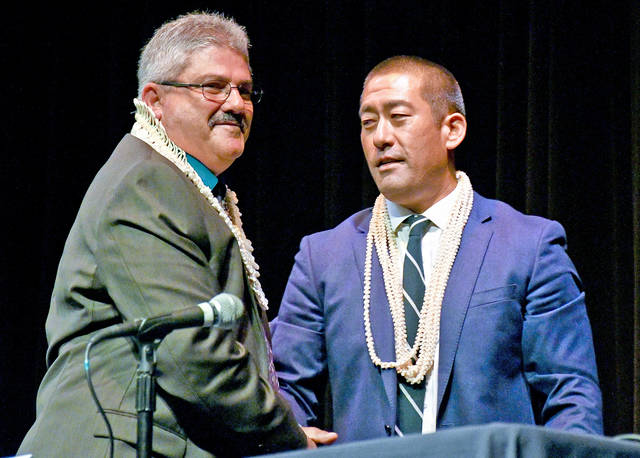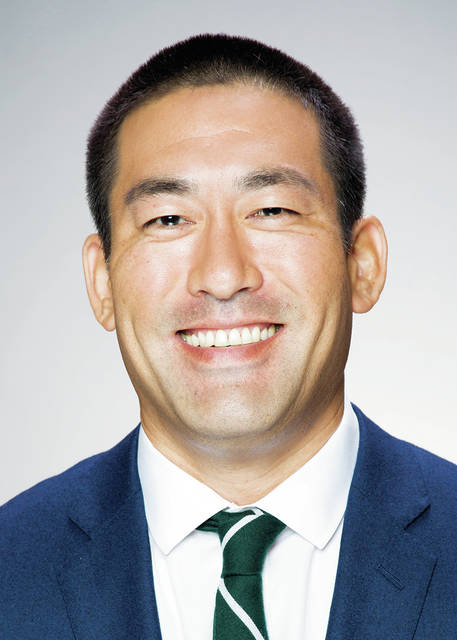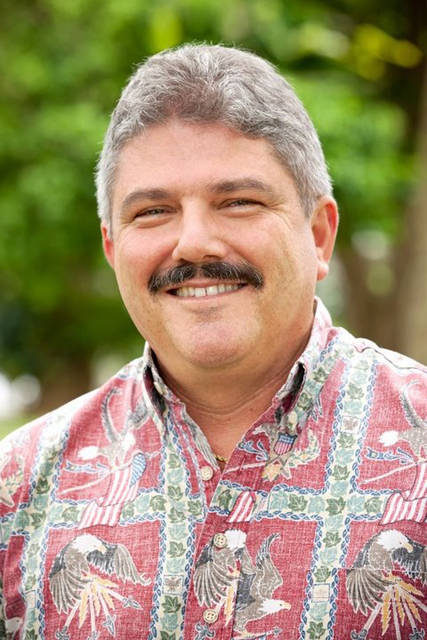HAENA — It was a political debate like no other.
At about 5:30 Wednesday afternoon, a column of five pickups and one small blue sedan slipped unobtrusively into the middle of the scheduled Kuhio Highway convoy from Hanalei to Wainiha and headed west with the long line of vehicles.
A hint as to the purpose of the special column came a few minutes before, when County Councilmember Derek Kawakami — running for mayor — started working the waiting convoy. He strode with purpose from vehicle to vehicle, shaking hands, slapping backs, talking story.
The six additional vehicles carried both mayoral candidates — Kawakami and County Council Chair Mel Rapozo — and nine of the 14 candidates for County Council to the Opakapaka Grill and Bar at Hanalei Colony Resort in Haena, where they would participate in an extraordinarily North Shore-centric candidate debate.
The forum was sponsored by the Hanalei-to-Haena Community Association.
The area west of Hanalei remains closed to non-residents because of flood damage from the disastrous mid-April storm, and this hyperlocal debate would be the only opportunity during the campaign for the candidates as a group to interact with the storm-impacted voters.
Opakapaka has become the de facto seat of the small community of an estimated 350 to 400 people who remain in the area despite the hardships of living there. From the small cross-section of apparent regulars Wednesday, it was clear that locals heavily rely on Opakapaka as a meeting place.
In a large seating area that had been cleared out for the debate, about 40 people gathered to hear candidates respond to questions. The number may seem low, but it represented about 10 percent of the population.
They focused on issues like the conditions on the highway, illegal transient vacation rentals, how the county will assure service by any new shuttle service connecting Princeville to Kee Beach, the wave of tourists that local people fear will re-invade once the road reopens and permanent limitation of vehicle access to the area to residents only.
TVR issues have historically been a hot issue in the Wainiha-Haena-Ke‘e area because, while TVRs account for one in eight homes islandwide, one of every two houses in the corridor west of Hanalei is a vacation rental, according to the community association.
In the mysterious tradition of Kauai candidate forums, all questions were posed by a single moderator and didn’t involve any direct interaction between the audience and candidates. Applause was discouraged.
County Council candidates present included: Juno Apalla, Arthur Brun, Mason Chock, Felicia Cowden, Luke Evslin, Arryl Kaneshiro, Kipukai Kualii, Adam Roversi and Milo Spindt. Absent were Kanoe Ahuna, Billy DeCosta, Shaylene Iseri, Ross Kagawa and Norma Doctor Sparks.
Kawakami and Rapozo determined who would speak first by playing the rock-paper-scissors game, then transitioned to what seemed at times almost like an instructional lecture. Patiently, they explained that the county can’t simply order all TVRs to go out of business nor can the county repair the state highway.
Rapozo was characteristically blunt. “When it comes to nonconforming uses (by TVRs), there’s not a lot we can do about that,” he said.
Both candidates said they supported legislation to lift the ability to easily transfer entitlements to operate a TVR when a property is sold.
“Even if it’s inherited,” said Kawakami.
He said it’s important to remember the overwhelming presence of TVRs from Hanalei to the end of the road.
“Out here, it’s one house in two,” Kawakami said.
Rapozo was critical of existing vacation rental enforcement efforts.
“They’re not doing enough,” he said of county Planning Department TVR enforcement personnel. “Old-fashioned, backyard police work — that’s what we need.”
Reprising a familiar campaign theme, Kawakami urged residents to recognize that solutions to the dilemmas of the North Shore all necessitate better public-private partnership approaches.
“It’s got to be the entire community’s effort,” he said of steps to address the issues that surfaced in the debate questions.
“We have to give the community back to the residents,” Rapozo said. He said that if he’s elected, he would end waivers of shoreline setback requirements.
“Absolutely no waivers,” he vowed.
Kawakami urged residents to do more to understand the complexities of climate change and how it may affect islands like Kauai differently depending on any exact location.
“Because we’re a coastal community, we’re gonna feel climate change,” he said.
The debate among council candidates reflected almost no major disagreements. Exceptions were when Spindt said the North Shore has no need for additional affordable housing.
Cowden, who is identified heavily with the North Shore community in which she lives, reminded the audience that relieving traffic and congestion in Hanalei may cause it to increase in places like Kokee State Park and elsewhere on the Westside. She urged sensitivity to unforeseen consequences that may come from reducing congestion in one area, but increasing it elsewhere.
The Opakapaka bar continued serving throughout the debate, and as the council candidates kept speaking the audience dwindled. It seemed clear people found little separating them. Eventually, the debate ended and the remaining audience was encouraged to move into the bar so the dining room, in which the debate occurred, could be prepared for the next day’s service.
Then at exactly 8:45, the candidates, the column vehicle drivers and others walked out into the parking lot, climbed into cars and even pickup truck beds and turned left out of the driveway to catch the 9 p.m. convoy back to Hanalei.
•••
Allan Parachini is a former public relations executive and Kilauea resident who writes periodically for The Garden Island.






alan what is your obsession with TVRs? aren’t you an anathema yourself, being an east coast transplant? leave and donate your nice house to local kanaka family.
The silly circus really losing popularity…. maybe the candidates need to entertain like the real politicians, and give out free food and drinks? Would have fed the majority who are starving for support in tangible ways NOT MORE RHETORIC!
Aloha Kakou,
It appears that both our currently elected leaders, as well as our upcoming to be elected leaders, are struggling with the new “wave” of tourism to our fairly tiny island.
Since we do not hear it from any of them, and apparently, as to any of their recent broad world travel, few, if any of our in-place elected leaders, or the new hopefuls, have much world travel experience, especially important is comparing travel 20 years ago to today.
Tourism Times have been changed dramatically !
While it is only my opinion, but one I have heard from many visitors as well, it shares my own feelings, and perhaps yours as well, that when it comes to travel in all the Hawaiian islands there is a “ho hum…been there done that” feeling of ones exeperience of traveling to the Hawaiian Islands…EXCEPT KAUAI…in comparison with other parts of the world ultra destinations.
Kaua’i is the unchallenged Gem of the Pacific. We have it and it requires a wise amount of respect and protection created by our elected leaders and shared by our population. It must be satisfying and sustainable as both visitor and locals alike depend on Kaua’i for each’s own needs.
What is happening worldwide in the last 20 years in the travel industry, and especially in the last 10 and 5 years is a new deluge in travelers. Way back in the day a large % of people never ventured more than 50 miles from their home, in their entire lifetime. Why even on Kaua’i we have chatted with old timers who have not been to the other side of the island in 50 years, nor off island…ever! How’s that ?
The point to be made is that not only is there a hurricane strength of online and other media advertising about worldwide travel destinations, there are new hordes of more and more people wanting , willing, and can afford to travel world wide…to Lauai too.
Of all the spectacular travel destinations in the world, places as remote as Hawaii are no longer considered remote, Kaua’i is a thrilling, exotic, beautiful beyond words, safe, a bit costly, but sensible stop over traveling the width or length of the Pacific Ocean.
So long as world peace and the economy hold out the visitors will keep coming, only in greater numbers…Hordes.
If our elected people, nowadays they should be elected as problem solvers as much as anything, are unaware of what is happening worldwide in the travel industry, how could they know how to solve the problem here; seems they need to get a first hand knowledge of it. They must miss some council meetings and travel, and paid for with county funds for our sanity and life style protection…otherwise we better make visitors get special Kaua’i visas before they enter the ship or plane to come here…and exclude many from even arriving much less over crowding our roads, beaches, vista lookouts, and restaurants, etc. Who do we choose to exclude? By income, life style, just what…but exclude is discrimination.
There are some visitor destination places that you could hardly walk on the sidewalks 10 years ago, and are now destinations where people are now forced off sidewalks and walking on the streets. They are coming, Kaua’i is just to good to be ignored and passed over. We are not prepared, the typical Kaua’i knee-jerk and band-aid response is and will not work. New ideas and thus new people may be the must.
And worse, every plane arriving on Kaua’i has some one on board, who Will return to their home and then son come back to live here, and that will only be those who will raise the cost of home or condo ownership out of the reach of all the born and raised people…”Aloha and Goodbye” will be the words spoken at the Lihue Airport as families are split up forever…no more generations to perpetuate families, the Hawaiians, after well over a thousand years, the Caucasians and Asians for over 200 years, the real culture of Hawaii impossible to be carried forward, lost forever, extinct, like species in the wild, not protected until too late. Then Pau Already…! ! !
And who will the new voters be, not by family, not by culture as that will change too, more so by offshore income.
It might be wise to send now , with county paid for expenses, young, born and raised, and educated, with clear desire to remain lifelong residents, youth of Kaua’i from all our diverse cultures, sent to the wonderful and also over crowded world visitor destinations to see how others are failing or competently handling, for the right reasons, this new never before seen trend on earth. Over Tourism.
While Genghis Khan did it differently, he too wrecked a lot of places. The Hordes come to mind. They are are arriving all day every day at our airport.
No one is talking solutions…not even him…Chim.
Mahalo,
Charles
Felicia Cowden comment ” reminded the audience that relieving traffic and congestion in Hanalei may cause it to increase in places like Kokee State Park and elsewhere on the Westside. She urged sensitivity to unforeseen consequences that may come from reducing congestion in one area, but increasing it elsewhere.”
Thank you for recognizing this and making the north shore residence aware. Many wouldn’t know or see that since the North side of Kauai has been closed off how congested the West side is, traffic has increase on a daily bases.
The only time you’d see traffic on the west side was during the Waimea Town Celebration and now its on a daily especially in the afternoon times. Polihale is becoming like Oahu’s Waikiki on the weekends/Holidays and its not just the tourist!
If one in two houses “from Hanalei to the end of the road” are temporary vacation rentals, why is this commercial enterprise being supported in a state park by taxpayers’ money?
Aloha, Milo Spindt here. The article quotes me out of context, the full statement included my explanation: Hanalei to Haena should not have any additional density or housing but I FULLY support building more affordable housing in Princeville, closer to jobs and existing infrastructure. Thanks! Glad to answer any other questions about this.
I’m glad you cleared that up! I was there and heard your comment, so I was taken aback by the very misleading way it was reported. You made it very clear that you supported more affordable housing in Princeville, which is still North Shore last time I checked. I was very positively impressed with your honesty and thoughtful approach to the issues. Thanks for coming out all the way to Ha’ena through the convoy to talk to us! We do feel rather cut off at the moment, so we really appreciated you all making the effort to meet with us.
Thank you. They were very good questions and I hope I was able to earn your vote and some of the others there. Aloha, Milo